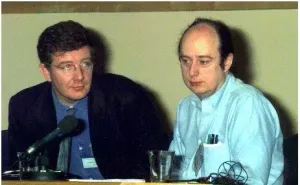I first met Cliff in 1990. I was on a study trip to the US and Canada, commissioned by the British Library to prepare a report on emerging network trends in libraries, with a special emphasis on the US. It was an early activity associated with UKOLN at the University of Bath, which the BL partly funded (the UK Office for Library and Information Networking, which has since ceased to exist).
The Division of Library Automation at the University of California, under Cliff's leadership, had been a pioneer in networking and shared systems. Melvyl was an important early example of a shared, network system with some scale, and Cliff was an authority on the emerging Z39.50 protocol which was a central part of what I was looking at.
It was my first trip to the US. I was a little nervous, compounded by the fact that my wardrobe was unsuited to the climate and the relaxed Californian working environment. However, I was immediately put at ease by Cliff's gentle, curious welcoming manner. He was very generous with his and his colleagues' time, and created a schedule with care and attention.
I observed with interest the collegial working environment he fostered in the office. This was my first introduction to Cliff in person - to his thoughtful conversation and gracious social presence. It was a revelation for me and provided a glimpse into what was to make his contribution to libraries and the research community so special over many years. He combined deep computational knowledge with a complex appreciation of the evolving scholarly and cultural record in a network environment. This was integral to how he saw libraries - as critical and inseperable elements of the infrastructure and practice of research and scholarship.
Later, when the report was published, Cliff reviewed it at length. Characteristically, the review appeared in what we might now call a Diamond access publication, The Public-Access Computer Systems Review, an important early electronic journal. I think the positive review may have influenced the release of a second edition of the report by Meckler for a US audience.
He correctly identified some of the traits of my subsequent writing career:
Sometimes, the coverage is a bit encyclopedic, which makes for slightly tedious reading, but such detail is necessary in a comprehensive report.
From my current perch in the US, I was interested to be reminded of this passage from his kind concluding comments.
This is a wonderful book that we should thank Dempsey for writing and the British Library for supporting. (I do find myself thinking, parochially, that it is strange that the first real book on these topics has been written from a European perspective and underwritten by the British Library. The topics covered are terribly important to the library, information science, and networking communities. Why hasn't this type of book been written from a U.S. perspective?)
This visit began a long relationship.
Cliff later came to the UK to present in the series of conferences we organized at the University of Bath. I remember a discussion in Bath between Cliff and the affable and inspirational Paul Evan Peters, who was at the time the inaugural leader of the Coalition for Networked Information. They agreed that they would readily pay for a service that managed the transfer of their luggage between destinations, with which they could then occasionally rendezvous. That said, packing was simplified for Cliff as he became identified with a standard outfit of jeans and blue oxford shirt.
From this vantage point, it is difficult to capture the excitement of those early Internet years. There was a magical and formative period, between that early promise and the later Amazoogle enclosure. And the inclusive and generous vision of Paul, Cliff and the early CNI was an important part of that, aiming initially to provide a venue for conversation between libraries, publishers and technologists. While the library element may have come to dominate, it always fostered connections.
It was in Bath also, that we met Cecilia for the first time, which began a long exchange about Irish tea and whiskey and yarn. Cliff's work depended on Cecilia's support in so many ways.
Professional and personal interactions continued as CNI developed a strong working relationship with UKOLN and with Jisc, the national information and networking infrastructure organization, with which I later worked for a while. We organized a series of joint US/UK conferences, which provided an ongoing collaborative venue, and an important input into the extensive project and development work of Jisc in subsequent years.
Cliff was also a contributor to the second Dublin Core meeting which UKOLN jointly organized in Warwick in the UK. I remember reading a transcript of some remarks by Cliff on this event which rendered 'Warwick' as 'Woolworths.' And indeed, 'divided by a common language' was the title I adopted for a presentation I was invited to give to the fourth Jisc/CNI event about differences between the UK and the US library environments. Again, I remember speaking to Cliff about my remarks, considering on the one hand the incredible volume and variety of institutions in the decentralized US higher education environment, and on the other, the important shared services infrastructure being put in place by Jisc in the UK. We joked about how far away hills seem greener, so that while some of the US delegates envied the shared attention possible through Jisc in the UK, many of the UK delegates envied the scale and capacity of the larger US organizations.
When I was first offered a job in the US I immediately reached out to Cliff for advice. Later, when I occasionally entered into discussions about other jobs, I sometimes sought his guidance. On one memorable (for me) occasion, he strongly advised that I withdraw my interest in a library Dean role: he argued that the library in question did not have great institutional support. He was always candid and direct in this way, even as his delivery remained gentle and considered. I remember I sent him a piece I had written early in the pandemic about likely trends. He gently nudged me away from publishing it, as something that would date badly.
For many people, Cliff was CNI. Although of course he always acknowledged the strong contributions of Joan and of the other members of the team that made it work. When I think about CNI and Cliff's CNI career three things stand out for me.
First, Cliff and his colleagues made CNI an extraordinarily successful venue for scaling learning and innovation across the library community and beyond. As much as through any formal presentations, this was through the congregation and personal networks it facilitated. Like all successful networks, it offered a venue where people could pool their uncertainty, gain confidence in new approaches, connect with like minds, identify potential hires or new job opportunities, and serendipitously connect with people and ideas. This is how norms, ideas, and innovation diffuse. It promotes sharing, mentoring, and career growth. This was valuable in immeasurable ways.
Second, there was Cliff's intellectual contribution. I would occasionally remark that CNI was a brain support mechanism for Cliff, and I was only half-joking. I believe that many members were more than happy to make an investment in CNI in order to provide a community space for Cliff to reflect on directions and to share his thoughts. Colleagues valued his luminously synthetic introductions to the meetings, the publications that immediately patterned your response to particular topics, his remarkably fluent presentations delivered with a few notes, and his generous counsel. His reading was wide, across the very technical, as well as the social and cultural. Much will be said about all of this by others. I will just note here that no matter how often one saw him do it, one was always awestruck by his range, insight and shaping powers.
Finally, Cliff was a bridge from the research library community to other communities and organizations. His effectiveness here depended not only on the knowledge and insight he brought into any conversation, but also on the universal recognition that he was motivated by a desire to lift up all interested parties in support of research and scholarship.
Perhaps the library community doesn't have the scale to generate a deep historical perspective. It would be especially interesting to document the web of influence and development in the period in which Cliff was active, which saw research, learning and cultural expression shape and be re-shaped by the evolving material base of the network and the digital.
Cliff has a special place as somebody whose work and writing with the University of California influenced emerging library services, and who transitioned into a role where he selflessly and persistently worked to help a community be a better version of itself.
Work interests meant that I did not go to CNI regularly for several years. I was very pleased when Cliff asked me to deliver the keynote at CNI after my departure from OCLC was announced. It did not turn out to be my best outing; I was trying too much to live up to the occasion and I ended up saying too little because I actually said too much.
Cliff was kind and I was touched by the enthusiasm with which he described how keynote speakers were added to the CNI meeting invitation list. In this way, he suggested in his reserved way, he hoped I would attend future meetings. I will miss the opportunity of being able to relax into such quiet interactions based on long shared history and conversations.
Cecilia's loss is immense. It may be a small comfort to know that Cliff's influence is strong and active in all the lives that he touched.
Note: Feature picture and caption by John Kirriemuir in a 1997 interview with Cliff for Ariadne. Cliff talks about his role at the University of California and his transition to CNI, as well as about various network information topics.



